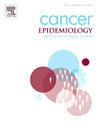Evaluating sex-specific prediction models for colorectal cancer risk using a genome-wide polygenic risk score and lifestyle factors in a Japanese population
IF 2.3
3区 医学
Q3 ONCOLOGY
引用次数: 0
Abstract
Background
The predictive performance of a colorectal cancer (CRC) risk prediction model incorporating genome-wide polygenic risk scores (PRSs) and lifestyle factors remains unclear in Asian populations. This study aimed to develop and evaluate the Asian-specific models using a Japanese population-based prospective study.
Methods
We derived 31 genome-wide PRSs using a genome-wide association study of CRC from the Biobank Japan and selected the best-performing PRS with the highest C-index in development case-cohort, including 200 incident cases. In evaluation case-cohort, including 693 incident cases, we assessed the discrimination accuracy (C-index, integrated discrimination improvement (IDI), and net reclassification improvement (NRI)) of lifestyle, PRS, and combined models using 5-fold cross-validation methods and estimated 10-year absolute risk.
Results
Of the 31 derived PRSs, the PRS aggregating 104,677 variant risks performed best in the development case-cohort. The men and women in the highest quintiles of the PRS had an approximately three-fold and two-fold higher risk of CRC, respectively, than those in the lowest in the evaluation case-cohort. Meanwhile, the association of lifestyle factors with CRC risk was observed only in men. Incorporating the PRS into a lifestyle model improved the C-index from 0.64 to 0.66 for men and from 0.61 to 0.63 for women. The IDI and NRI values supported this improvement. The 10-year absolute risk was 3.3 % and 1.6 % for high-risk men and women, respectively, and 0.5 % for both low-risk men and women.
Conclusions
This study suggests that the CRC risk prediction model utilizing genome-wide PRS for Asians is valuable; however, further improvement is needed before clinical implementation.
使用全基因组多基因风险评分和日本人群生活方式因素评估结直肠癌风险的性别特异性预测模型
结合全基因组多基因风险评分(prs)和生活方式因素的结直肠癌(CRC)风险预测模型在亚洲人群中的预测性能尚不清楚。本研究旨在通过一项基于日本人群的前瞻性研究,开发和评估亚洲特定模型。方法利用来自日本Biobank的CRC全基因组关联研究,我们获得了31个全基因组PRS,并在发展病例队列中选择了c指数最高的最佳PRS,包括200例事件病例。在评估病例队列中,包括693例事件病例,我们使用5倍交叉验证方法评估了生活方式、PRS和组合模型的识别准确性(c指数、综合识别改善(IDI)和净重新分类改善(NRI)),并估计了10年绝对风险。在31个衍生的PRS中,汇总了104,677个变异风险的PRS在发展病例队列中表现最好。在评估病例队列中,PRS最高五分之一的男性和女性患CRC的风险分别比最低五分之一的男性和女性高约3倍和2倍。同时,生活方式因素与结直肠癌风险的关联仅在男性中观察到。将PRS纳入生活方式模型后,男性的c指数从0.64提高到0.66,女性从0.61提高到0.63 。IDI和NRI值支持了这一改善。高风险男性和女性的10年绝对风险分别为3.3 %和1.6 %,低风险男性和女性的10年绝对风险分别为0.5 %。结论基于全基因组PRS的亚洲人结直肠癌风险预测模型是有价值的;然而,在临床应用之前,还需要进一步的改进。
本文章由计算机程序翻译,如有差异,请以英文原文为准。
求助全文
约1分钟内获得全文
求助全文
来源期刊

Cancer Epidemiology
医学-肿瘤学
CiteScore
4.50
自引率
3.80%
发文量
200
审稿时长
39 days
期刊介绍:
Cancer Epidemiology is dedicated to increasing understanding about cancer causes, prevention and control. The scope of the journal embraces all aspects of cancer epidemiology including:
• Descriptive epidemiology
• Studies of risk factors for disease initiation, development and prognosis
• Screening and early detection
• Prevention and control
• Methodological issues
The journal publishes original research articles (full length and short reports), systematic reviews and meta-analyses, editorials, commentaries and letters to the editor commenting on previously published research.
 求助内容:
求助内容: 应助结果提醒方式:
应助结果提醒方式:


